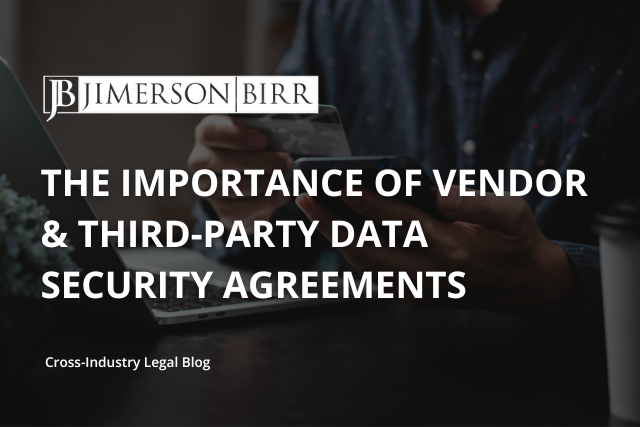A single vendor data breach can cost a Florida SMB hundreds of thousands of dollars in fines, lawsuits, and lost customer trust. Working with third-party vendors is essential for growth and operations, but these relationships often involve sharing sensitive data with vendors that may not uphold the same cybersecurity standards as your business.
A breach caused by a vendor can result in financial losses, reputational damage, operational disruption, and legal action. Just because the breach originates with a vendor doesn’t mean your business is free from liability. That is why every Florida SMB sharing or otherwise making accessible any data to outside vendors should have a vendor data security agreement and written policies that clearly outline cybersecurity obligations, liability protections, and breach response protocols.
The Consequences of a Data Breach for Florida SMBs
A breach of customer or employee data can trigger penalties under the Florida Information Protection Act (FIPA) and Fla. Stat. § 501.171.
Florida businesses must:
- Notify affected individuals within 30 days of discovering a breach.
- Notify the Florida Department of Legal Affairs if 500+ residents are affected.
- Notify consumer reporting agencies (CRAs) if 1,000+ individuals are affected.
Non-compliance can result in fines of $1,000 per day for the first 30 days, escalating to $50,000 per 30-day period thereafter, up to $500,000 total—even if the breach occurred at the vendor level.
Beyond regulatory penalties, breaches bring potential class action lawsuits. Claims of negligence or failure to meet contractual obligations are common. The financial and reputational toll—including legal fees, IT remediation, and lost customer trust—can be devastating.
FIPA also requires businesses to implement reasonable safeguards to protect personal information and retain records of those measures for at least five years.
Our article A Three Step Guide to Complying with Applicable Law When Your Data Has Been Breached expands on what is entailed in FIPA compliance.
Why Third-Party Breaches Still Create Liability
Third-party vendors often process or store data on behalf of your business – and courts increasingly hold businesses responsible for failing to adequately vet or monitor these vendors. Under Florida law, when businesses collect or maintain personally identifiable information (PII), they owe a duty of care to protect that data, regardless of who held it when the breach occurred. According to a 2024 Ponemon Institute study, 59% of data breaches are linked to third-party vendors, underscoring the importance of vendor oversight.
Lawsuits may include claims for negligence, breach of implied contract, or unjust enrichment. Without proper vendor agreements, it is difficult to mount a strong legal defense. (For more see Data Breach Class Action Defense – Contractual and Quasi-Contractual Claims and How Poor Data Security Policies Lead to Regulatory Fines & Lawsuits).
Contract Terms That Help Mitigate Risk
A strong vendor agreement can significantly reduce your exposure. Key provisions include:
- Data Security Standards: Require compliance with frameworks like NIST, SOC 2, or HITRUST. Specify controls such as encryption, access management, and regular testing.
- Regulatory Compliance: Vendors should commit to following all applicable privacy and cybersecurity laws, including FIPA, HIPAA (regulating the healthcare industry) or GLBA (regulating financial institutions).
- Breach Notification: Vendors should notify you promptly of any security incident, allowing your business to meet its 30-day notice obligation under FIPA.
- Incident Response Plans: Contracts should outline procedures for breach response, disaster recovery, and continuity of operations.
- Indemnification: Make sure vendors agree to cover losses stemming from their failure to meet contract terms.
- Limitation of Liability: While fair to vendors, this clause should still allow your business to recover damages in the event of gross negligence.
- Audit Rights: Request annual System Organizational Control (SOC) reports or security assessments to confirm the vendor’s practices meet agreed standards.
- Data Disposal and Return: Upon termination, vendors must return or securely destroy your data.
Preventative Measures and What to Do If a Breach Happens
An up-to-date Information Security Plan and a clear breach response protocol are key to both compliance and minimizing fallout from a data breach. Businesses that collect or transfer personally identifiable information (PII) should act before a crisis hits by establishing internal procedures that meet Florida law. Whether preparing in advance or responding in real time, having these measures in place makes legal compliance far more manageable.
Even if the breach originates with a vendor, your business is still responsible for FIPA compliance. Steps include:
- Investigate the breach, determine its scope and identify the affected individuals.
- Coordinate with law enforcement, if appropriate.
- Notify the Florida Department of Legal Affairs within 30 days (if 500+ individuals are affected).
- Notify affected individuals in writing in accordance with FIPA.
- Notify CRAs if over 1,000 individuals are impacted.
- Document all actions taken in your response and preserve records for five years.
Encryption can be a safe harbor: if breached data was encrypted and rendered unreadable, notice may not be required. However, each incident should be assessed individually.
Governing Law and Enforceability
Vendor agreements should include governing law and venue clauses that favor Florida courts. Also, consider waiver provisions that limit the vendor’s ability to shift blame or file counterclaims.
As discussed in Jimerson Birr’s article in Lenders and Vendors Beware: Deprizio Can Spoil Insider Guarantees, enforceability often hinges on precise contract language and applicable state law. In both breach response and bankruptcy scenarios, well-drafted agreements can be the difference between risk containment and financial loss.
Conclusion: Protect Your Business
Your data security is only as strong as the vendors you trust—and the contracts that govern them. Florida SMBs must recognize that legal liability extends beyond internal systems to every outside party that handles sensitive information.
Your vendor contracts are your first line of defense against data breaches. Contact Jimerson Birr to draft or revise vendor data security agreements that protect your business, ensure FIPA compliance, and minimize legal risk.

